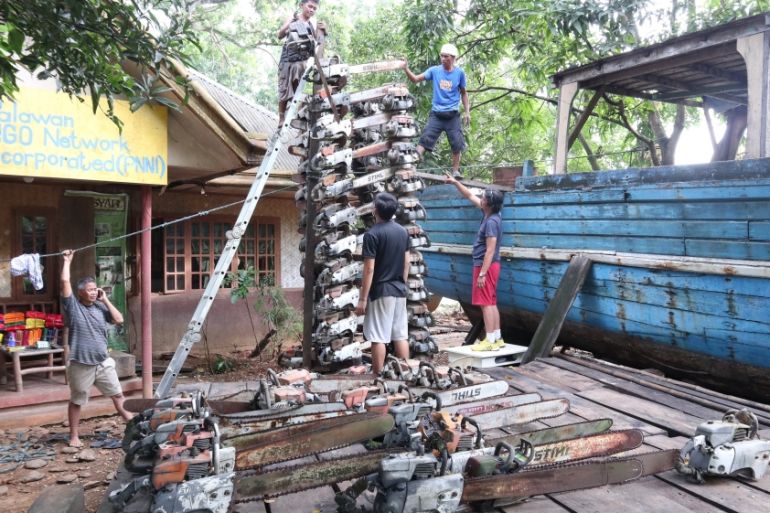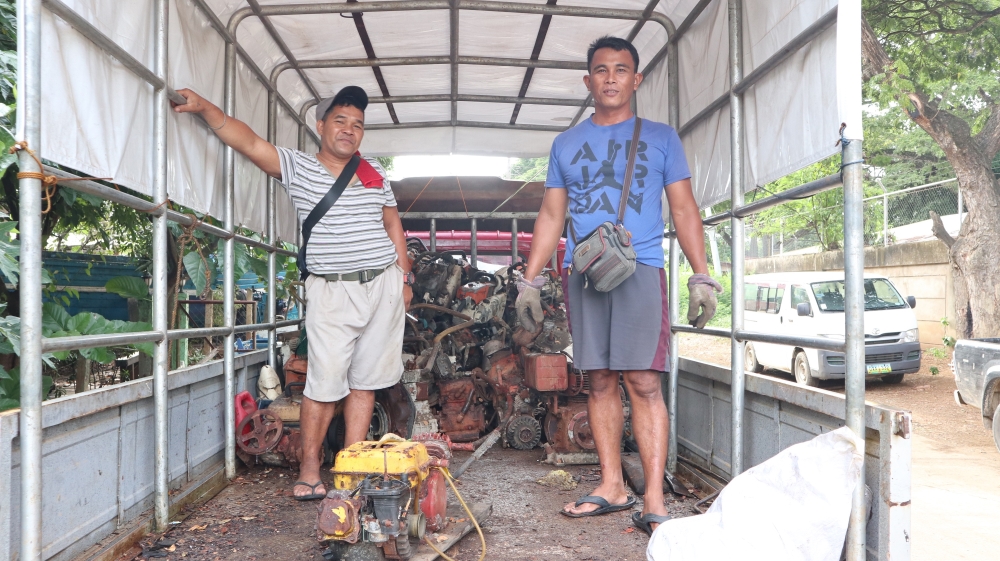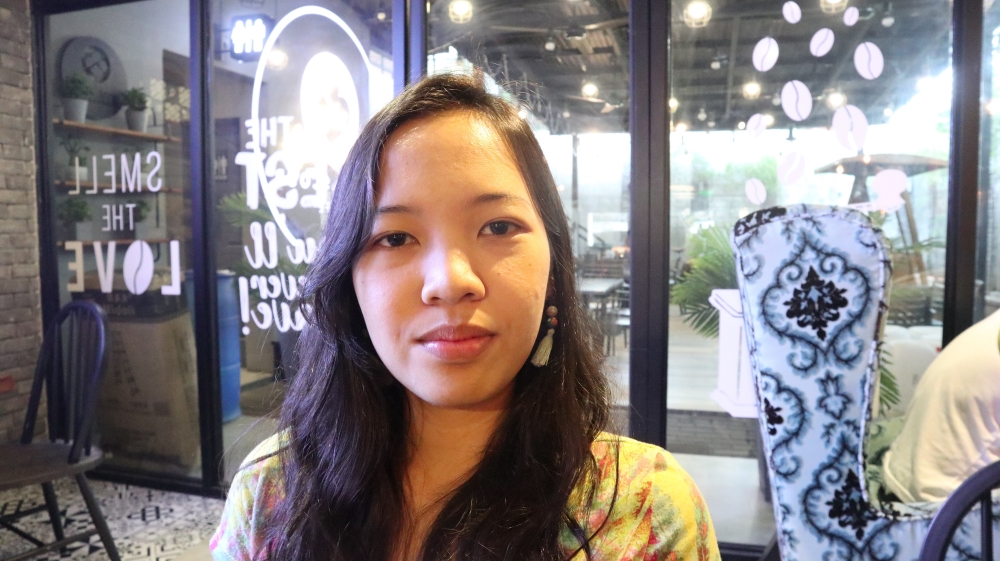Threats, raids and murders stalk Filipino environment activists
From September to November 2019, four more environment workers across the country were killed.

Palawan, Philippines – In the heart of the Philippines tourist hotspot of Palawan, Bobby Chan stood on a shaded porch outside his office and admired his spoils: decaying boats used for illegal fishing, sticks of dynamite seized from forest poachers, and a tower of chainsaws.
“I lost count at 700,” he said.
Keep reading
list of 3 itemsFood giant Del Monte accused of complicity in Philippine attacks
Environmental activist deaths on rise
Chan heads the Palawan NGO Network Inc (PNNI), which uses an obscure citizen’s arrest law to deal with poachers threatening the western island’s endangered and endemic species, seizing chainsaws, dynamite and fishing boats.
Chan and his “para-enforcers” are among those most at risk in a country recently named the world’s deadliest for environmental defenders by the international watchdog, Global Witness.
“Things have gotten worse under Duterte,” said Ben Leather, senior campaigner for Global Witness, referring to Philippine President Rodrigo Duterte.
“Now, anyone who wants to silence dissidents can be pretty sure they can get away with it.”
In 2018, Global Witness said at least 30 environmental and land defenders were killed in the country, many of whom are engaged in conflict with powerful business interests including the food giant Del Monte.
The vast majority of cases remain unsolved, despite Duterte’s initial promises to confront corrupt politicians and corporate conflicts of interest.
|
|
In September this year, forest ranger Bienvenido Veguilla Jr, was hacked to death in El Nido, Palawan, after he and his team came across illegal logging activities in the area. In a span of three months, three other environment workers were also killed, including one environmental investigator, who was shot in late November in Mindanao.
As environment campaigners arrived in Manila to present the findings of the report on the Philippines, local organisations that assisted in its preparation say they were monitored by police, threatened with raids, and branded as communist rebels.
Karl Begnotea, of Kalikasan PNE, an environmental network which assisted Global Witness in data collection, told Al Jazeera that he was subject to police surveillance as the groups prepared to present the report’s findings in Manila in late September.
“The threat becomes real,” Begnotea said, noting that authorities are also now targeting groups in Manila, whereas previously the majority of the raids happened in rural areas.
Targeted in Paradise
In Palawan, PNNI, the environmental NGO, is moving to a new location across town. The former headquarters sits next to a compound owned by Palawan’s governor, Jose Alvarez.
A onetime logging magnate, Alvarez and his family have significant investments in tourism and real estate on the island, including the luxurious Maremegmeg Beach Club in El Nido.
According to Global Witness, it found evidence of illegal timber entering the site during construction.
“The tourism we have now is uncontrolled,” Chan said.
Chan and Alvarez have been at odds ever since PNNI seized guns, which bore the governor’s name in an anti-logging operation.

In 2015, Alvarez challenged Chan to a fistfight over his opposition to mining in old-growth forests.
“The threats are more brazen now,” Chan said.
Chan and his colleagues regularly report being followed and threatened in Puerto Princesa, the provincial capital.
Since PNNI began conducting enforcement operations in 2001, 12 members have been killed, including Ruben Arzaga, who died after he was shot in the head by illegal loggers in 2017.
Most killings do not happen during operations. Instead, activists are targeted as they go about their daily lives, Chan said. He believes all 12 killings were premeditated.
‘In the line of fire’
PNNI members have also been “red-tagged,” or labelled as members of the communist New People’s Army, an armed fighting unit considered to be a terrorist organisation by the Philippine government.
The tactic has been used throughout the country, including the southern island of Mindanao, which has been under martial law since 2017. On November 8, the international charity Oxfam was accused by authorities of being a communist front.
“It’s a deliberate smokescreen. There is no doubt these people were threatened because of their activism,” Leather said. “It’s so brazen that it would be laughable if it weren’t so dangerous.”
“If you’re vocal, they think you’re seditious,” added Chan, himself a frequent target of red-tagging.
“If you’re seditious, they think you’re a rebel.”
PNNI enforcers operate unarmed, approaching loggers at a safe distance and forming a perimeter, then asking for identity documents and confiscating guns and chainsaws.
Chan recruits citizens defending their own livelihoods: farmers, fishermen and Indigenous peoples threatened by illegal logging, mining, fishing and wildlife trafficking.
Teofilo Tredez, a farmer who joined PNNI in 2005 and leads operations targeting illegal open-pit mines in the south of the island, said the work was “important to protecting farmland. The life of farmers comes from the water.”
Like all PNNI members, Tredez has his fair share of war stories.
Once, a colleague grabbed a chainsaw by the blade, mistakenly switched it on and refused to let go as its owner fled the scene. His hand required 62 stitches, but the chainsaw was seized.
“It’s something you hope would be lauded,” Leather said. “But they’re put in the line of fire.”
Al Jazeera contacted Alvarez’s office, as well as the Philippine National Police and Quezon City Police. None had responded to requests for comment on the allegations by the time of the publication.
Threats of raid
Days before Global Witness visited the Philippines for the September report launch, Kalikasan PNE employers received a tip-off that the police were planning a raid on their office. Outside, they noticed an officer recording a video of their activities on his smartphone.
The staffers say they met a local official in early October, after another vehicle passed by the office.

“They said that yes, there is a threat of a raid on your office,” said Gia Glarino, a spokesperson for Kalikasan PNE.
The network was accused of teaching “radical” ideology to Indigenous children from Mindanao who oppose plantations and mining. The group also hosts older Indigenous students studying at the University of the Philippines.
Meanwhile, the Manila-based Center for Environmental Concerns (CEC) reported receiving threats of potential raids for hosting Indigenous students, research and advocacy coordinator Lia Alonzo told Al Jazeera.
The group has led opposition to the China-backed Kaliwa Dam project in Luzon, which the government says is necessary to provide water to Manila.
Indigenous residents living on the proposed dam site say they are being coerced into giving their consent to relinquish their lands, and the CEC has questioned the validity of the project’s recently granted environmental compliance certificate.
Police initially denied planning raids on Manila-based NGOs. But between October 31 and November 5, multiple police raids saw the arrests of 57 activists in Negros and six in Manila.
Members of the environment group, Kalikasan, and other Manila NGOs vacated their offices.
The series of incidents aligned not only with the Global Witness report, but with September’s global climate strike and a series of key anniversaries of killings of land activists in Negros.
Begnotea said the threats left Kalikasan focused not on its work, but on defending itself.
“They don’t need to declare actual martial law,” he said. “They’ve already learned how to terrorise people.”